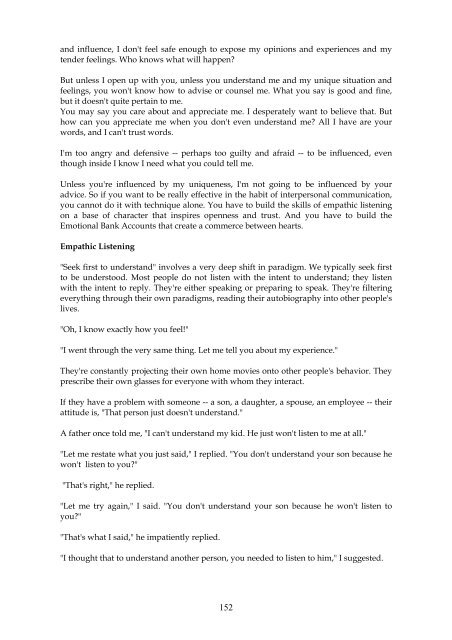Covey - The 7 habits of highly effective people
You also want an ePaper? Increase the reach of your titles
YUMPU automatically turns print PDFs into web optimized ePapers that Google loves.
and influence, I don't feel safe enough to expose my opinions and experiences and my<br />
tender feelings. Who knows what will happen?<br />
But unless I open up with you, unless you understand me and my unique situation and<br />
feelings, you won't know how to advise or counsel me. What you say is good and fine,<br />
but it doesn't quite pertain to me.<br />
You may say you care about and appreciate me. I desperately want to believe that. But<br />
how can you appreciate me when you don't even understand me? All I have are your<br />
words, and I can't trust words.<br />
I'm too angry and defensive -- perhaps too guilty and afraid -- to be influenced, even<br />
though inside I know I need what you could tell me.<br />
Unless you're influenced by my uniqueness, I'm not going to be influenced by your<br />
advice. So if you want to be really <strong>effective</strong> in the habit <strong>of</strong> interpersonal communication,<br />
you cannot do it with technique alone. You have to build the skills <strong>of</strong> empathic listening<br />
on a base <strong>of</strong> character that inspires openness and trust. And you have to build the<br />
Emotional Bank Accounts that create a commerce between hearts.<br />
Empathic Listening<br />
"Seek first to understand" involves a very deep shift in paradigm. We typically seek first<br />
to be understood. Most <strong>people</strong> do not listen with the intent to understand; they listen<br />
with the intent to reply. <strong>The</strong>y're either speaking or preparing to speak. <strong>The</strong>y're filtering<br />
everything through their own paradigms, reading their autobiography into other <strong>people</strong>'s<br />
lives.<br />
"Oh, I know exactly how you feel!"<br />
"I went through the very same thing. Let me tell you about my experience."<br />
<strong>The</strong>y're constantly projecting their own home movies onto other <strong>people</strong>'s behavior. <strong>The</strong>y<br />
prescribe their own glasses for everyone with whom they interact.<br />
If they have a problem with someone -- a son, a daughter, a spouse, an employee -- their<br />
attitude is, "That person just doesn't understand."<br />
A father once told me, "I can't understand my kid. He just won't listen to me at all."<br />
"Let me restate what you just said," I replied. "You don't understand your son because he<br />
won't listen to you?"<br />
"That's right," he replied.<br />
"Let me try again," I said. "You don't understand your son because he won't listen to<br />
you?"<br />
"That's what I said," he impatiently replied.<br />
"I thought that to understand another person, you needed to listen to him," I suggested.<br />
152


